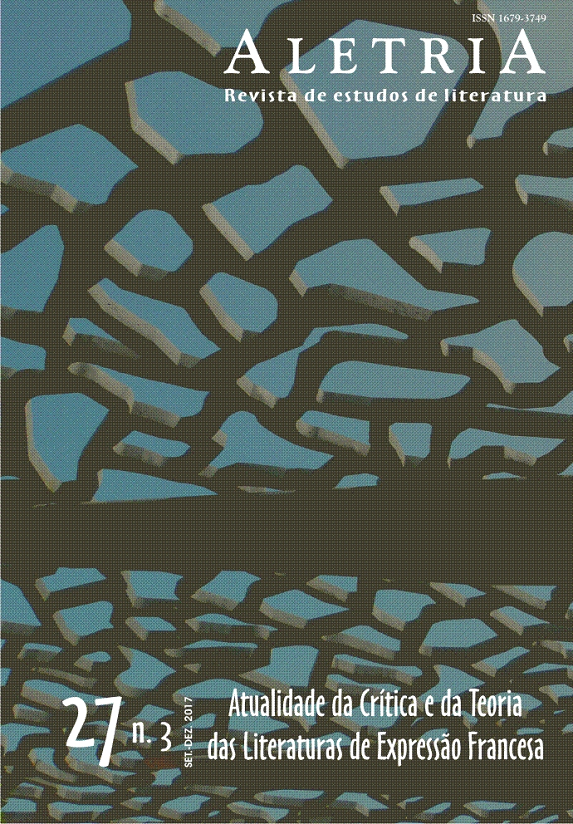Qualities for a Poetry Without Qualities
DOI:
https://doi.org/10.17851/2317-2096.27.3.129-146Keywords:
poetry without qualities, Christophe Hanna, Jean-Marie-Gleize, Manuel de FreitasAbstract
The present article reflects on how certain contemporary poetry articulates issues concerning that genre. After all, what is poetry? When is a text poetry? And how to think and create poetry from a conception of poetry that estabilishes no predetermined qualities for it? It is from an openness to new possibilities that the French poet Jean-Marie Gleize and Christophe Hanna, linked to the group Questions Théoriques, and the Portuguese Manuel de Freitas undertake critical readings of the poetry in the contemporary world by the bias of the absence of qualities. In this sense, this work intends to understand not only what brings them closer but also what differentiates them.
Downloads
References
BENJAMIN, Walter. Experiência e pobreza. In: BENJAMIN, Walter. Magia e técnica, arte e política: ensaios sobre literatura e história da cultura. Tradução de Sergio Paulo Rouanet. 3. ed. São Paulo: Brasiliense, 1987. p. 114-119.
COMETTI, Jean-Pierre. L’Art sans qualité. Tours: Farrago, 1999.
DEGUY, Michel. Film à venir. In: GORRILLOT, Bénédicte; LESCART, Alain (Org.). L’Illisibilité en questions. Villeneuve d’Ascq: Presses Universitaires du Septentrion, 2014.
FREITAS, Manuel. Beau séjour. Lisboa: Assírio & Alvim, 2003.
FREITAS, Manuel. Game over. Lisboa: & etc., 2002.
FREITAS, Manuel. O tempo dos puetas. In: FREITAS, Manuel (Org.). Poetas sem qualidades. Lisboa: Averno, 2002. p. 5-8.
FREITAS, Manuel. Pedacinhos de ossos. Lisboa: Averno, 2012.
FREITAS, Manuel. Todos contentes e eu também. Porto: Campo das Letras, 2000.
GLEIZE, Jean-Marie et al. Opacité critique. In: GLEIZE, Jean-Marie et al. Toi aussi, tu as des armes: poésie & politique. Paris: La Fabrique Éditions, 2011. p. 27-44.
GLEIZE, Jean-Marie. Depressa! Tradução de Masé Lemos. Lado 7, Rio de Janeiro, n. 4, p. 9-21, out. 2012.
GLEIZE, Jean-Marie. Film à venir, conversions. Paris: Seuil, 2007.
GLEIZE, Jean-Marie. La Post-poésie: un travail d’investigation-élucidation. Revista Matraga, Rio de Janeiro, v. 17, n. 27, p. 121-133, jul./dez. 2010.
GLEIZE, Jean-Marie. Les Chiens s’approchent, et s’éloignent. Alea, Rio de Janeiro, v. 9, n. 2, p. 165-175, 2007.
GLEIZE, Jean-Marie. Néon, actes et légendes. Paris: Seuil, 2004.
GLEIZE, Jean-Marie. Poesia poor, respostas. Tradução de Alexandre Rosa. Alea, Rio de Janeiro, v. 15, n. 2, p. 438-448, 2013.
HANNA, Christophe. Assez vu! In: GLEIZE, Jean-Marie. Sorties. Paris: Questions Théoriques, 2009. p. 7-17.
HANNA, Christophe. Petits poëmes en prose. Marseille: Al Dante/Niok, 1998.
HANNA, Christophe. Poésie action directe. Paris: Al Dante/Éditions Léo Scheer, 2002.
HANNA, Christophe. Préface. In: GLEIZE, Jean-Marie. Litteralité: poésie et figuration; e, À noir: Poésie et littéralité. Paris: Questions Théoriques, 2015. p. I-XV.
MARTELO, Rosa. O olhar do alegorista na poesia portuguesa contemporânea. Portuguese Cultural Studies, Utrecht, n. 2, p. 11-22, Winter 2009.
NANCY, Jean-Luc. Fazer, a poesia. Alea, Rio de Janeiro, v. 15, n. 2, p. 414-422, 2013.
QUINTANE, Nathalie. Entretien: D’une génération à l’autre. In: GORRILLOT, Bénédicte et LESCART, Alain (Org.). L’Illisibilité en questions. Villeneuve d’Ascq: Presses Universitaires du Septentrion, 2014. p. 195-198.
QUINTYN, Olivier. Valences de l’avant-garde: essai sur l’avant-garde, l’art contemporain et l’institution. Paris: Questions Théoriques, 2015.
SEDLMAYER, Sabrina. Jacuba é gambiarra. Belo Horizonte: Autêntica, 2017.
THOMAS, Jean-Jacques. Avec Gleize: aporie herméneutique illustrée. In: GORRILLOT, Bénédicte; LESCART, Alain (Org.). L’Illisibilité en questions. Villeneuve d’Ascq: Presses Universitaires du Septentrion, 2014. p. 159-168.
Downloads
Additional Files
Published
How to Cite
Issue
Section
License
Copyright (c) 2017 Masé Lemos (Autor)

This work is licensed under a Creative Commons Attribution 4.0 International License.
Authors who publish with this journal agree to the following terms:Authors retain copyright and grant the journal right of first publication with the work simultaneously licensed under a Creative Commons Attribution Non-Commercial No Derivatives License that allows others to share the work with an acknowledgement of the work's authorship and initial publication in this journal.Authors are able to enter into separate, additional contractual arrangements for the non-exclusive distribution of the journal's published version of the work (e.g., post it to an institutional repository or publish it in a book), with an acknowledgement of its initial publication in this journal.Authors are permitted and encouraged to post their work online (e.g., in institutional repositories or on their website) prior to and during the submission process, as it can lead to productive exchanges, as well as earlier and greater citation of published work (See The Effect of Open Access).





